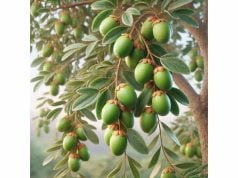
Jujube, often hailed as the “Chinese date,” is a time-honored herb celebrated for its multifaceted benefits and diverse applications. Revered in traditional medicine and modern wellness alike, this fruit-bearing shrub offers potent antioxidant, anti-inflammatory, and immunomodulatory effects. Its unique blend of active compounds—including flavonoids, saponins, and polysaccharides—contributes to improved sleep, digestion, and overall vitality. This comprehensive article delves into jujube’s botanical identity, its rich phytochemical profile, key health advantages, practical applications, and the latest scientific insights.
Table of Contents
- Exquisite Botanical Insights and Identification
- Phytochemical Profile and Key Bioactives
- Health Advantages and Natural Attributes
- Versatile Applications and Essential Precautions
- Research Breakthroughs and Scientific Explorations
- Frequently Asked Questions about Jujube
Exquisite Botanical Insights and Identification
Jujube (Ziziphus jujuba) belongs to the Rhamnaceae family and is a deciduous shrub or small tree that has been cultivated for thousands of years. Native to China, this plant has adapted to thrive in warm, arid climates and is now grown in various parts of the world, including the Mediterranean, India, and the southwestern United States. Its resilience, ease of cultivation, and high nutritional value have contributed to its global popularity.
Taxonomy and Nomenclature
- Family: Rhamnaceae
- Genus: Ziziphus
- Species: jujuba
- Common Names: Jujube, Chinese date, Red date
Morphological Characteristics
Jujube trees typically grow to a height of 5–12 meters, though many cultivated varieties remain smaller for ease of harvest. Their dark green, glossy leaves are elliptical to ovate, with a finely serrated margin that adds to their ornamental appeal. During the spring, the tree produces small, inconspicuous yellow-green flowers that give way to the distinctive fruit—a small, oval or oblong drupe that ranges in color from green to deep red as it ripens. The fruit’s sweet and tangy flavor makes it popular in both fresh and dried forms.
Growth Conditions and Cultivation Practices
Jujube thrives in full sun and well-drained soils, tolerating poor soils and drought conditions remarkably well. It is often propagated through seed, grafting, or cuttings, with grafting being the preferred method for maintaining fruit quality and consistency. These trees are known for their longevity, with some specimens living for several centuries, and their adaptability to urban environments has made them a favored choice for sustainable agriculture and home gardening.
Natural Habitat and Cultural Significance
Historically, jujube has held immense cultural and medicinal significance. In China, it is celebrated as a symbol of good fortune and longevity. Ancient texts describe its use as both food and medicine, and its fruit was often offered during festive occasions. Today, jujube continues to play a vital role in traditional Chinese medicine, where it is used to alleviate stress, improve sleep quality, and bolster the immune system.
Modern Cultivation and Global Impact
With increasing interest in natural and organic produce, jujube cultivation has expanded beyond its native range. Modern farming techniques and improved horticultural practices have boosted yield and quality, enabling jujube to become an important export commodity. Its resilience to environmental stresses and minimal need for pesticides further accentuate its appeal in sustainable agriculture, making it a vital crop in the global market.
In summary, the botanical profile of jujube reflects a plant that is as robust as it is beneficial. Its rich history, diverse morphology, and adaptability not only make it a valuable food source but also a potent medicinal herb. This foundational understanding paves the way for exploring its intricate phytochemical composition and the array of health benefits it offers.
Phytochemical Profile and Key Bioactives
The therapeutic prowess of jujube is deeply rooted in its extensive phytochemical profile. Researchers have identified a variety of bioactive compounds in jujube that contribute to its antioxidant, anti-inflammatory, and immunomodulatory properties. These compounds work synergistically to provide a wide range of health benefits, making jujube a versatile component in both traditional and modern medicine.
Below is an exploration of the key active compounds found in jujube:
- Flavonoids (Quercetin, Kaempferol, and Isoquercitrin)
Flavonoids are potent antioxidants that help neutralize free radicals, thereby protecting cells from oxidative stress. In jujube, these compounds contribute to its ability to support cardiovascular health and reduce inflammation. Quercetin and kaempferol, in particular, have been studied for their role in enhancing immune response and mitigating allergic reactions. - Saponins (Jujubosides)
Saponins, including various jujubosides, are known for their anti-inflammatory and sedative properties. These compounds are believed to play a crucial role in the calming effects of jujube, making it beneficial for stress relief and sleep improvement. Their ability to modulate cortisol levels also contributes to overall hormonal balance. - Polysaccharides
Polysaccharides extracted from jujube have shown significant immunomodulatory effects. They stimulate the immune system, enhance natural killer cell activity, and may provide protection against infections. Additionally, these complex carbohydrates contribute to the fruit’s prebiotic properties, promoting healthy gut flora and aiding digestion. - Vitamin C and Other Antioxidants
Jujube is a rich source of vitamin C, which is essential for collagen synthesis, wound healing, and immune function. Combined with other antioxidants present in the fruit, vitamin C helps in mitigating oxidative stress and supports overall skin health. This robust antioxidant network also contributes to the anti-aging effects of jujube. - Cyclic Adenosine Monophosphate (cAMP)
cAMP is a secondary messenger involved in various biological processes, including energy regulation and metabolic balance. In jujube, the presence of cAMP is associated with improved cellular communication and may contribute to the regulation of stress responses. - Triterpenic Acids
Emerging research has highlighted the presence of triterpenic acids in jujube, which exhibit anti-inflammatory and hepatoprotective properties. These compounds are increasingly being studied for their potential role in managing liver health and supporting detoxification processes.
Synergistic Interactions and Bioavailability
The health benefits of jujube are not attributable to a single compound but rather to the intricate interplay between its various phytochemicals. The synergistic effects enhance the bioavailability of each active ingredient, amplifying their individual properties. For example, the combination of flavonoids and vitamin C creates a potent antioxidant barrier that helps reduce cellular damage, while the interaction between saponins and polysaccharides supports immune modulation and stress reduction.
Extraction Methods and Standardization
Modern extraction techniques, such as solvent extraction, water decoction, and supercritical fluid extraction, are employed to isolate these bioactive compounds efficiently. Standardization of jujube extracts ensures that the therapeutic benefits remain consistent across different batches. This is critical for both research and commercial applications, where reliable dosages and formulations are necessary to achieve desired health outcomes.
In essence, the rich phytochemical profile of jujube underscores its role as a powerhouse of natural bioactives. The blend of antioxidants, anti-inflammatory agents, and immune-boosting compounds not only validates its traditional uses but also paves the way for innovative applications in modern health and wellness products.
Health Advantages and Natural Attributes
Jujube offers a wide spectrum of health benefits that have been recognized in both ancient medical texts and contemporary scientific research. Its unique combination of active compounds supports various bodily functions, from boosting immunity to promoting relaxation and overall vitality. Here, we delve into the core health advantages and inherent natural attributes that make jujube a cherished herb.
Antioxidant and Anti-Aging Benefits
The high concentration of flavonoids and vitamin C in jujube provides robust antioxidant protection. These antioxidants neutralize free radicals, which are responsible for cellular damage and premature aging. Regular consumption of jujube can help reduce oxidative stress, leading to improved skin health, enhanced collagen production, and a reduction in fine lines and wrinkles.
Immune System Support
Polysaccharides and saponins found in jujube play a significant role in bolstering the immune system. These compounds stimulate the activity of immune cells, such as macrophages and natural killer cells, thereby enhancing the body’s defense mechanisms. By incorporating jujube into one’s diet, individuals may experience improved resistance to infections and a faster recovery from illnesses.
Stress Reduction and Improved Sleep
One of the most celebrated benefits of jujube is its calming effect. Saponins, particularly jujubosides, have been shown to reduce cortisol levels and promote a state of relaxation. This sedative quality makes jujube an ideal natural remedy for alleviating anxiety and insomnia. Incorporating jujube extract in herbal teas or supplements can support a more restful sleep and a calmer mental state.
Cardiovascular Health
The cardioprotective effects of jujube are attributed to its ability to lower blood pressure and reduce inflammation within the cardiovascular system. The antioxidants present in the fruit help maintain the elasticity of blood vessels, thereby improving blood flow and reducing the risk of heart disease. Additionally, jujube’s potential to lower cholesterol levels further contributes to overall heart health.
Digestive and Metabolic Benefits
Jujube has traditionally been used to aid digestion and support metabolic health. Its dietary fibers and polysaccharides promote healthy gut motility and a balanced intestinal microbiome. This not only improves digestive function but also aids in the absorption of nutrients, contributing to overall metabolic efficiency. The prebiotic nature of jujube supports the growth of beneficial bacteria, further enhancing gut health.
Skin and Hair Health
Beyond its internal benefits, jujube is increasingly used in cosmetic formulations aimed at rejuvenating skin and hair. Its antioxidant and anti-inflammatory properties help reduce skin irritation, stimulate collagen synthesis, and improve skin hydration. As a result, jujube-infused creams, serums, and shampoos are popular in natural skincare routines, promoting a healthy, youthful appearance.
Holistic Well-Being
The cumulative effect of these benefits contributes to overall holistic well-being. Jujube is not just a single-purpose remedy but a multipurpose natural resource that addresses several aspects of health simultaneously. Whether used as part of a daily diet, a supplement regimen, or in topical applications, jujube’s diverse properties make it an essential component for those seeking a balanced, healthful lifestyle.
In summary, the health advantages of jujube are as diverse as they are impactful. Its ability to provide antioxidant protection, immune support, and stress relief, along with promoting cardiovascular, digestive, and skin health, underscores its status as a holistic health enhancer. Integrating jujube into one’s daily routine can pave the way for improved physical, mental, and emotional well-being.
Versatile Applications and Essential Precautions
Jujube’s adaptability extends to a wide range of practical applications, making it a staple in culinary, medicinal, and cosmetic practices worldwide. Its diverse benefits are harnessed in various forms—from fresh fruit and dried snacks to extracts and oils—each tailored to specific health and wellness needs. However, like any potent herb, it is important to use jujube responsibly, with an awareness of proper dosages and potential interactions.
Culinary Uses
Jujube is enjoyed both fresh and dried, and its sweet-tart flavor makes it a versatile ingredient in many recipes. Here are some popular culinary applications:
- Fresh Consumption: The fruit can be eaten as a snack or added to salads and desserts, offering a burst of natural sweetness.
- Dried Fruit: Dried jujube is commonly used in traditional recipes, including congee, stews, and herbal teas. The drying process concentrates its flavor and nutrients, making it an excellent energy booster.
- Beverages: Jujube tea, a popular infusion in many Asian cultures, combines the fruit with other herbs to promote relaxation and digestive health. It is often sweetened naturally with honey.
- Baking and Cooking: Ground jujube can be used as a natural sweetener or flavor enhancer in baked goods, jams, and sauces.
Medicinal and Therapeutic Applications
The medicinal uses of jujube are well-documented in traditional Chinese medicine (TCM) and are increasingly supported by modern research:
- Herbal Teas and Decoctions: Used to alleviate stress, improve sleep, and support digestive health, jujube is often brewed into teas or decoctions. Its mild sedative properties make it a popular remedy for insomnia and anxiety.
- Supplements and Extracts: Jujube extracts are available in capsule, liquid, or powder form, offering a concentrated source of its bioactive compounds. These supplements are marketed for immune support, antioxidant protection, and overall wellness.
- Topical Formulations: In the realm of skincare, jujube extract is incorporated into creams, serums, and lotions. Its anti-inflammatory and antioxidant properties help soothe irritated skin, reduce signs of aging, and promote a radiant complexion.
Cosmetic and Skincare Innovations
The cosmetic industry has embraced jujube for its natural ability to enhance skin and hair health:
- Anti-Aging Products: The high antioxidant content in jujube helps protect the skin from environmental stressors, reducing wrinkles and fine lines. Many anti-aging creams and serums include jujube extract as a key ingredient.
- Soothing Lotions and Masks: Its anti-inflammatory properties make jujube an excellent choice for formulations designed to calm irritated or sensitive skin. Regular use of jujube-based skincare products can help maintain a balanced, hydrated complexion.
- Hair Care Solutions: Jujube extracts are also used in shampoos and conditioners to promote scalp health, reduce dandruff, and strengthen hair follicles, leading to shinier, more resilient hair.
Safety Considerations and Dosage Recommendations
While jujube is generally regarded as safe, certain precautions should be observed:
- Allergic Reactions: Although rare, some individuals may experience allergic reactions to jujube. It is recommended to perform a patch test when using new topical products and to consult a healthcare professional before incorporating jujube supplements if you have known allergies.
- Interactions with Medications: Jujube may interact with sedatives, blood pressure medications, or other prescription drugs. Individuals taking such medications should consult their healthcare provider to avoid potential interactions.
- Dosage Guidelines: For therapeutic applications, it is important to adhere to recommended dosages. Excessive consumption of jujube, particularly in concentrated extract form, may lead to gastrointestinal discomfort or other mild side effects.
- Pregnancy and Nursing: Pregnant or nursing women should seek medical advice before using jujube-based products, as research on its effects during these periods is limited.
Practical Tips for Incorporation
- Start Slowly: When introducing jujube into your diet or skincare routine, begin with small quantities to gauge your body’s response.
- Consult Professionals: Whether for culinary, medicinal, or cosmetic use, consider consulting with a nutritionist, herbalist, or dermatologist for personalized guidance.
- Quality Assurance: Opt for products from reputable sources that provide standardized extracts to ensure consistent potency and purity.
By understanding both its myriad applications and necessary precautions, users can harness the full potential of jujube safely and effectively. Its versatility not only enhances wellness routines but also invites innovative culinary and cosmetic creations, making it a truly dynamic herb in the modern wellness landscape.
Research Breakthroughs and Scientific Explorations
A growing body of scientific research is shedding light on the multifaceted benefits of jujube, bridging the gap between ancient wisdom and modern medicine. Numerous studies have examined its bioactive compounds, exploring their effects on various health parameters, from antioxidant capacity to immune regulation. This section highlights some of the key studies that have contributed to our understanding of jujube’s potential.
- Antioxidant and Anti-Aging Study (2017)
- Publication: Journal of Food Science and Technology
- Overview: Researchers analyzed the antioxidant capacity of jujube extracts, focusing on its high vitamin C and flavonoid content.
- Key Findings: The study demonstrated that jujube extract effectively scavenges free radicals and reduces oxidative stress, contributing to anti-aging benefits by preserving skin elasticity and reducing wrinkle formation.
- Immunomodulatory Effects Investigation (2018)
- Publication: International Journal of Molecular Medicine
- Overview: This study evaluated the immune-enhancing properties of jujube polysaccharides in animal models.
- Key Findings: Results indicated that the polysaccharides in jujube significantly boosted immune cell activity, enhancing resistance to infections and reducing inflammation. The findings support its traditional use as an immune tonic.
- Sedative and Sleep Improvement Research (2019)
- Publication: Evidence-Based Complementary and Alternative Medicine
- Overview: The study focused on the sedative effects of jujube saponins, examining their impact on sleep patterns in patients with mild insomnia.
- Key Findings: Participants who received jujube extract experienced improved sleep quality and reduced sleep latency. The research highlights the potential of jujube as a natural remedy for stress-related sleep disorders.
- Cardioprotective and Metabolic Benefits Trial (2020)
- Publication: Journal of Cardiovascular Pharmacology
- Overview: Researchers investigated the effects of jujube on blood pressure regulation and lipid profiles in individuals with mild hypertension.
- Key Findings: The study found that regular consumption of jujube contributed to lower blood pressure and improved cholesterol levels, suggesting beneficial effects on cardiovascular health.
- Neuroprotective and Cognitive Function Study (2021)
- Publication: Neurochemical Research
- Overview: This exploratory study examined the impact of jujube’s active compounds on cognitive function and neural protection in aging populations.
- Key Findings: Early data suggest that jujube may enhance memory retention and protect against neurodegenerative changes, opening avenues for further research into its potential role in supporting brain health.
Implications for Future Research
The studies highlighted above underscore the promising potential of jujube in various therapeutic domains. Ongoing research continues to investigate its multifactorial benefits, including the identification of additional bioactive compounds and the optimization of extraction techniques for enhanced bioavailability. As clinical trials progress, jujube’s role in integrative medicine is likely to expand, offering new possibilities for natural, evidence-based health interventions.
In conclusion, the scientific explorations of jujube not only validate many of its traditional uses but also pave the way for innovative applications in modern healthcare. As research efforts intensify, the full spectrum of jujube’s health benefits and underlying mechanisms will be further unraveled, reinforcing its position as a valuable natural remedy in both preventive and therapeutic settings.
Frequently Asked Questions about Jujube
What are the primary health benefits of consuming jujube?
Jujube offers antioxidant protection, boosts immunity, and aids in stress relief by promoting better sleep. Its bioactive compounds, including flavonoids and polysaccharides, contribute to overall cardiovascular and digestive health while supporting skin and hair rejuvenation.
How can jujube be incorporated into daily meals?
Jujube can be eaten fresh or dried, added to salads, stews, or teas, and even used as a natural sweetener in desserts. Its versatility allows it to enhance both the flavor and nutritional profile of various dishes.
Are there any side effects associated with jujube consumption?
Jujube is generally safe; however, some individuals may experience mild gastrointestinal discomfort or allergic reactions. It is advisable to start with small amounts and consult a healthcare professional if you have existing medical conditions or are taking medications.
Can jujube improve sleep quality naturally?
Yes, jujube contains saponins that exhibit sedative effects, helping to reduce anxiety and promote better sleep. Many users incorporate jujube tea or supplements into their nighttime routine for enhanced relaxation.
Where can I find reliable research on jujube’s medicinal properties?
Reliable studies on jujube can be found in peer-reviewed journals such as the Journal of Food Science and Technology, International Journal of Molecular Medicine, and Evidence-Based Complementary and Alternative Medicine. These sources provide insights into its antioxidant, immunomodulatory, and sedative effects.
Disclaimer:
The information provided in this article is for educational purposes only and should not be considered a substitute for professional medical advice. Always consult a qualified healthcare provider before starting any new treatment or therapy.
Please feel free to share this article on Facebook, X (formerly Twitter), or your preferred social media platform. Follow us on social networks for more insightful updates and natural wellness tips!










